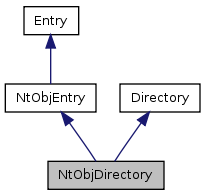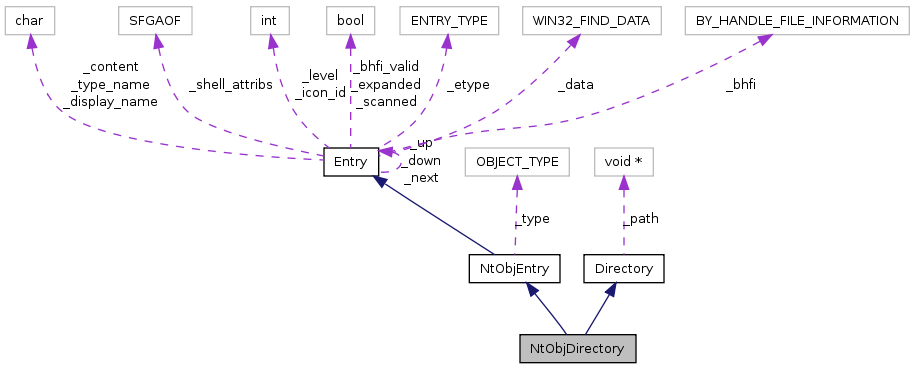NtObj file system directory-entry. More...
#include <ntobjfs.h>


Public Member Functions | |
| NtObjDirectory (LPCTSTR root_path) | |
| NtObjDirectory (Entry *parent, LPCTSTR path) | |
| ~NtObjDirectory () | |
| virtual void | read_directory (int scan_flags=0) |
| virtual Entry * | find_entry (const void *) |
Detailed Description
NtObj file system directory-entry.
Definition at line 100 of file ntobjfs.h.
Constructor & Destructor Documentation
| NtObjDirectory::NtObjDirectory | ( | LPCTSTR | root_path ) | [inline] |
Definition at line 102 of file ntobjfs.h.
References Directory::_path.
Referenced by read_directory().
: NtObjEntry(DIRECTORY_OBJECT) { _path = _tcsdup(root_path); }

Definition at line 108 of file ntobjfs.h.
References Directory::_path.
: NtObjEntry(parent, DIRECTORY_OBJECT) { _path = _tcsdup(path); }
| NtObjDirectory::~NtObjDirectory | ( | ) | [inline] |
Definition at line 114 of file ntobjfs.h.
References Directory::_path.
Member Function Documentation
| Entry * NtObjDirectory::find_entry | ( | const void * | p ) | [virtual] |
Reimplemented from Entry.
Definition at line 359 of file ntobjfs.cpp.
References Entry::_data, Entry::_down, Entry::_next, and TEXT.
{
LPCTSTR name = (LPCTSTR)p;
for(Entry*entry=_down; entry; entry=entry->_next) {
LPCTSTR p = name;
LPCTSTR q = entry->_data.cFileName;
do {
if (!*p || *p==TEXT('\\') || *p==TEXT('/'))
return entry;
} while(tolower(*p++) == tolower(*q++));
p = name;
q = entry->_data.cAlternateFileName;
do {
if (!*p || *p==TEXT('\\') || *p==TEXT('/'))
return entry;
} while(tolower(*p++) == tolower(*q++));
}
return NULL;
}
| void NtObjDirectory::read_directory | ( | int | scan_flags = 0 ) |
[virtual] |
Reimplemented from Entry.
Definition at line 173 of file ntobjfs.cpp.
References Entry::_bhfi, Entry::_bhfi_valid, Entry::_content, Entry::_data, Entry::_down, Entry::_level, _MAX_PATH, Entry::_next, Directory::_path, Entry::_scanned, NtObjEntry::_type, Entry::_type_name, ATTRIBUTE_SYMBOLIC_LINK, CONTEXT, COUNTOF, DIRECTORY_OBJECT, KEY_OBJECT, NTDLL::NtClose, NtObjDirectory(), NtObjEntry::NtObjEntry(), NTDLL::NtQueryDirectoryObject, NTDLL::NtQueryObject, NTDLL::NtQuerySymbolicLinkObject, NTDLL::s_ObjectTypes, RtlUnicodeString::string_len, SYMBOLICLINK_OBJECT, TEXT, U2nA, UNKNOWN_OBJECT_TYPE, and wcsncpy_s.
{
CONTEXT("NtObjDirectory::read_directory()");
if (!g_NTDLL)
g_NTDLL = new NTDLL();
Entry* first_entry = NULL;
int level = _level + 1;
LPCTSTR path = (LPCTSTR)_path;
TCHAR buffer[MAX_PATH], *p=buffer;
#ifndef UNICODE
WCHAR wbuffer[MAX_PATH], *w=wbuffer;
#endif
do {
*p++ = *path;
#ifndef UNICODE
*w++ = *path;
#endif
} while(*path++);
--p;
#ifndef UNICODE
--w;
#endif
DWORD idx;
HANDLE dir_handle;
#ifdef UNICODE
if (NtOpenObject(_type, &dir_handle, 0, buffer))
#else
if (NtOpenObject(_type, &dir_handle, 0, wbuffer))
#endif
return;
#ifdef UNICODE
if (p[-1] != '\\')
*p++ = '\\';
#else
if (w[-1] != '\\')
*w++ = '\\';
#endif
NtObjectInfo* info = (NtObjectInfo*)alloca(2048);
if (!(*g_NTDLL->NtQueryDirectoryObject)(dir_handle, info, 2048, TRUE, TRUE, &idx, NULL)) {
WIN32_FIND_DATA w32fd;
Entry* last = NULL;
Entry* entry;
do {
memset(&w32fd, 0, sizeof(WIN32_FIND_DATA));
#ifdef UNICODE
if (info->name.string_ptr) {
info->name.string_ptr[info->name.string_len / sizeof(WCHAR)] = 0;
} else {
TCHAR empty_string_ptr[] = _T("");
info->name.string_ptr = empty_string_ptr;
}
if (info->type.string_ptr) {
info->type.string_ptr[info->type.string_len / sizeof(WCHAR)] = 0;
} else {
TCHAR empty_string_ptr[] = _T("");
info->type.string_ptr = empty_string_ptr;
}
lstrcpynW(p, info->name.string_ptr, COUNTOF(buffer));
#else
WideCharToMultiByte(CP_ACP, 0, info->name.string_ptr, info->name.string_len, p, COUNTOF(buffer), 0, 0);
#endif
lstrcpyn(w32fd.cFileName, p, sizeof(w32fd.cFileName) / sizeof(0[w32fd.cFileName]));
const LPCWSTR* tname = NTDLL::s_ObjectTypes;
OBJECT_TYPE type = UNKNOWN_OBJECT_TYPE;
for(; *tname; tname++)
if (!wcsncmp(info->type.string_ptr, *tname, 32))
{type=OBJECT_TYPE(tname-NTDLL::s_ObjectTypes); break;}
if (type == DIRECTORY_OBJECT) {
w32fd.dwFileAttributes |= FILE_ATTRIBUTE_DIRECTORY;
entry = new NtObjDirectory(this, buffer);
}
else if (type == SYMBOLICLINK_OBJECT) {
w32fd.dwFileAttributes |= ATTRIBUTE_SYMBOLIC_LINK;
entry = NULL;
#ifndef _NO_WIN_FS
if (*w32fd.cFileName>='A' &&*w32fd.cFileName<='Z' && w32fd.cFileName[1]==':')
if (!_tcsncmp(buffer,TEXT("\\??\\"),4) || // NT4
!_tcsncmp(buffer,TEXT("\\GLOBAL??"),9)) { // XP
w32fd.dwFileAttributes |= FILE_ATTRIBUTE_DIRECTORY;
entry = new WinDirectory(this, w32fd.cFileName);
}
#endif
if (!entry)
entry = new NtObjDirectory(this, buffer);
}
else if (type == KEY_OBJECT) {
w32fd.dwFileAttributes |= FILE_ATTRIBUTE_DIRECTORY;
entry = new RegistryRoot(this, buffer);
}
else
entry = new NtObjEntry(this, type);
HANDLE handle;
#ifdef UNICODE
lstrcpyW(p, info->name.string_ptr);
if (!NtOpenObject(type, &handle, 0, buffer))
#else
lstrcpyW(w, info->name.string_ptr);
if (!NtOpenObject(type, &handle, 0, wbuffer))
#endif
{
NtObject object;
DWORD read;
if (!(*g_NTDLL->NtQueryObject)(handle, 0/*ObjectBasicInformation*/, &object, sizeof(NtObject), &read)) {
memcpy(&w32fd.ftCreationTime, &object.creation_time, sizeof(FILETIME));
memset(&entry->_bhfi, 0, sizeof(BY_HANDLE_FILE_INFORMATION));
entry->_bhfi.nNumberOfLinks = object.reference_count - 1;
entry->_bhfi_valid = true;
}
if (type == SYMBOLICLINK_OBJECT) {
WCHAR wbuffer[_MAX_PATH];
UnicodeString link(_MAX_PATH, wbuffer);
if (!(*g_NTDLL->NtQuerySymbolicLinkObject)(handle, &link, NULL)) {
int len = link.string_len/sizeof(WCHAR);
entry->_content = (LPTSTR) malloc((len+1)*sizeof(TCHAR));
#ifdef UNICODE
wcsncpy_s(entry->_content, len+1, link, len);
#else
U2nA(link, entry->_content, len);
#endif
entry->_content[len] = '\0';
}
}
(*g_NTDLL->NtClose)(handle);
}
memcpy(&entry->_data, &w32fd, sizeof(WIN32_FIND_DATA));
#ifdef UNICODE
entry->_type_name = _wcsdup(info->type.string_ptr);
#else
char type_name[32];
WideCharToMultiByte(CP_ACP, 0, info->type.string_ptr, info->type.string_len, type_name, 32, 0, 0);
entry->_type_name = _strdup(type_name);
#endif
if (!first_entry)
first_entry = entry;
if (last)
last->_next = entry;
entry->_level = level;
last = entry;
} while(!(*g_NTDLL->NtQueryDirectoryObject)(dir_handle, info, 2048, TRUE, FALSE, &idx, NULL));
last->_next = NULL;
}
(*g_NTDLL->NtClose)(dir_handle);
_down = first_entry;
_scanned = true;
}

The documentation for this struct was generated from the following files:
